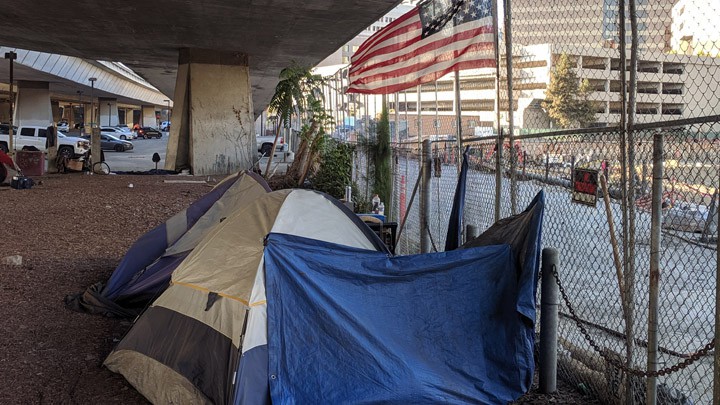
A homeless encampment under Highway 87 at San Fernando Road in downtown San Jose. Photo by Grendelkhan. CC-by-SA 4.0.
In the summer and fall of 2014, blocks from downtown San Jose on the banks of Coyote Creek near Story Road, hundreds of people with nowhere else to live put together rickety shelters and built the largest homeless encampment in the nation.
As the first wet winter in years began to drench the place, city and county officials decided the encampment, which had come to be called The Jungle, should be disassembled. As the city’s winter shelters were opened, teams of social workers visited the encampment to let residents know that there was help available if they wanted it. Most but not all took advantage of the offers.
In December, crews moved in and took the place apart as its last 300 residents went back into the streets. The event made headlines around the country and the world. Silicon Valley, in the wealthiest county in the United States and home to the nation’s largest homeless encampment, had scattered its residents.
County Supervisor Dave Cortese, San Jose Mayor Sam Liccardo, and other civic leaders had by late 2014 formed a task force to get serious about attacking the housing crisis. The task force included representatives from virtually every political faction in the city and county, from the South Bay Labor Council to the Silicon Valley Chamber of Commerce.
After more than a year of work, the Santa Clara County Housing Task Force got a bond placed on the November 2016 ballot that raised $950 million to help build housing and provide services to low-income people. The vast majority—$ 750 million—targeted very low-income people.
At the time, Cortese connected homelessness to the larger affordable housing crisis that was making life difficult for everyone in the Valley who isn’t rich. “Most people have someone in their family who is having trouble,” he said. “Maybe it’s their children or even their grandchildren. It’s time we do something bold. As I see it, this is our number one issue. And it’s now or never.”
The 2015-2020 Community Plan to End Homelessness
Watch a powerful KQED-TV report on “The Jungle” homeless encampment.
Long form articles which explain how something works, or provide context or background information about a current issue or topic.